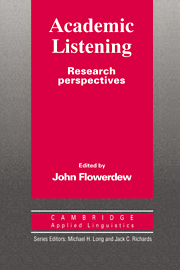Book contents
- Frontmatter
- Contents
- List of contributors
- Series editors' preface
- Acknowledgments
- Introduction
- I BACKGROUND
- II THE SECOND LANGUAGE ACADEMIC LISTENING PROCESS
- III DISCOURSE OF ACADEMIC LECTURES
- Chapter 6 Topic identification in lecture discourse
- Chapter 7 Variations in the discourse patterns favoured by different disciplines and their pedagogical implications
- Chapter 8 University lectures – macro-structure and micro-features
- IV ETHNOGRAPHY OF SECOND LANGUAGE LECTURES
- V PEDAGOGIC APPLICATIONS
- Conclusion
- Index
- Subject index
Chapter 6 - Topic identification in lecture discourse
Published online by Cambridge University Press: 05 October 2012
- Frontmatter
- Contents
- List of contributors
- Series editors' preface
- Acknowledgments
- Introduction
- I BACKGROUND
- II THE SECOND LANGUAGE ACADEMIC LISTENING PROCESS
- III DISCOURSE OF ACADEMIC LECTURES
- Chapter 6 Topic identification in lecture discourse
- Chapter 7 Variations in the discourse patterns favoured by different disciplines and their pedagogical implications
- Chapter 8 University lectures – macro-structure and micro-features
- IV ETHNOGRAPHY OF SECOND LANGUAGE LECTURES
- V PEDAGOGIC APPLICATIONS
- Conclusion
- Index
- Subject index
Summary
Abstract
Neither the issue of the role of notetaking in the lecture learning process, nor the issue of what is effective notetaking has been fully determined in first or second language listening. This chapter describes an approach to discourse analysis which identifies the major topics, subtopics and minor points of a lecture. The results of the analysis, a topic hierarchy of the lecture, can be used to evaluate the qualitative completeness of students' notes, that is, whether students have noted the important points of the lecture. The approach is demonstrated in the analysis of a graduate-level lecture on language teaching. Two topic analysis methods are employed: a topic identification method that combines elements from T. Givons (1979) sentential topic continuity measurements to identify the discourse markers that signal topic shift, and a topic framework method (Brown and Yule 1983) that incorporates the textual and contextual elements of the discourse situation that the speaker and students have access to. The topic hierarchy that results from the analysis is then compared against the notes of the students in the class, five LI graduate students and two L2 graduate students, to evaluate their notes for completeness and correctness of information.
Introduction
One of the issues to be dealt with in understanding the lecture learning process is determining the function of notetaking for students, and more specifically what notetaking methods help students succeed academically. The correspondence between notetaking and lecture learning for first language (LI) learners has been a matter of exploration for educational psychologists for the past seventy years.
- Type
- Chapter
- Information
- Academic ListeningResearch Perspectives, pp. 131 - 145Publisher: Cambridge University PressPrint publication year: 1995
- 1
- Cited by



